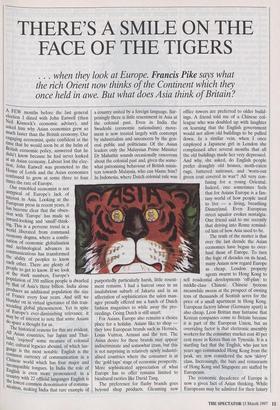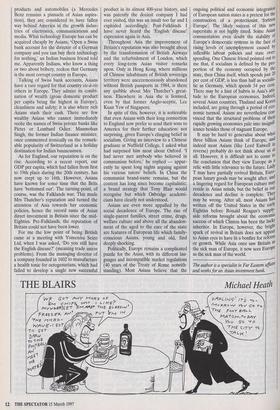THERE'S A SMILE ON THE FACE OF THE TIGERS
. . . when they look at Europe. Francis Pike says what
the rich Orient now thinks of the Continent which they once held in awe. But what does Asia think of Britain?
A FEW months before the last general election I dined with John Eatwell (then Neil Kinnock's economic adviser), and asked him why Asian economies grew so ranch faster than the British economy. Our engaging economist, quite confident at the time that he would soon be at the helm of British economic policy, answered that he didn't know because he had never looked at an Asian economy. Labour lost the elec- tion, John Eatwell was promoted to the House of Lords and the Asian economies continued to grow at some three to four times the rate of Europe. Our ennobled economist is not untypical of Europe's lack of interest in Asia. Looking at the European press in recent years, it has become clear that the obses- sion With 'Europe' has made us In ward-looking and `small'-think- Ing. This is a perverse trend in a world liberated from command economy dogma, where a combi- nation of economic globalisation and technological advances in communications has transformed the ability of peoples to know each other. There are plenty of People to get to know. If we look at the stark numbers, Europe's Population of 350 million people is dwarfed by that of Asia's three billion. India alone Produces an additional population the size of France every four years. And still we blunder on in virtual ignorance of this tran- scending global phenomenon. Yet in spite (3f Europe's ever-diminishing relevance, it may be of interest to note that some Asians do spare a thought for us. The historical reasons for this are evident. All Asian countries, bar Japan and Thai- land, 'enjoyed' some measure of colonial rule; cultural legacies abound, of which lan- guage is the most notable. English is the common currency of communication in a Chinese world which has four major and English tongues. In India the role of -c•nglish is even more pronounced: in a the with 22 official languages English is `ie lowest common denominator of commu- nication, making India that rare example of a country united by a foreign language. Sur- prisingly there is little resentment in Asia at the colonial past. Even in India the Swadeshi (economic nationalism) move- ment is now treated largely with contempt by industrialists and unconcern by the gen- eral public and politicians. Of the Asian leaders only the Malaysian Prime Minister Dr Mahathir sounds occasionally rancorous about the colonial past and, given the some- what patronising behaviour of British minis- ters towards Malaysia, who can blame him? In Indonesia, where Dutch colonial rule was purportedly particularly harsh, little resent- ment remains. I had a haircut once in an insalubrious suburb of Jakarta and in an affectation of sophistication the salon man- ager proudly offered me a batch of Dutch fashion magazines to while away the pro- ceedings. Going Dutch is still smart. For Asians, Europe also remains a choice place for a holiday. Asians like to shop they love European brands such as Hermes, Louis Vuitton, Armani and the rest. The Asian desire for these brands may appear indiscriminate and somewhat crass, but this is not surprising in relatively newly industri- alised countries where the consumer is at the 'gold taps' stage of economic prosperity. More sophisticated appreciation of what Europe has to offer remains limited to bicultural rarities like David Tang.
The preference for flashy brands goes beyond shop products. Gleaming new office towers are preferred to older build- ings. A friend told me of a Chinese col- league who was doubled up with laughter on learning that the English government would not allow old buildings to be pulled down. In a similar vein, when I once employed a Japanese girl in London she complained after several months that all the old buildings made her very depressed. And why, she asked, do English people prefer draughty old houses, moth-eaten rugs, battered suitcases, and 'worn-out green coat covered in wax'? All very con- fusing for a young Oriental. Indeed, one sometimes feels that for Asians Europe is a fan- tasy world of how people used to live — a living, breathing Disneyland. Even European street squalor evokes nostalgia. One friend said to me recently that driving into Rome remind- ed him of how Asia used to be.
The truth of the matter is that over the last decade the Asian economies have begun to over- haul those of Europe. To turn the logic of decades on its head, many Asians now regard Europe as cheap. London property agents swarm to Hong Kong to sell residential developments `off-plan' to middle-class Chinese. Chinese tycoons meanwhile swoon at the prospect of owning tens of thousands of Scottish acres for the price of a small apartment in Hong Kong. European factory labour (Germany apart) is also cheap. Leon Brittan may fantasise that Korean companies come to Britain because it is part of the European Union, but an overriding factor is that electronic assembly workers for the consumer market cost 40 per cent more in Korea than on Tyneside. It is a startling fact that the English, who just ten years ago commanded Hong Kong from the peak, are now considered the new 'skivvy' class. Increasingly, the bars and restaurants of Hong Kong and Singapore are staffed by Europeans.
The economic decadence of Europe is now a given fact of Asian thinking. While Europeans may be admired for their luxury products and automobiles (a Mercedes Benz remains a pinnacle of Asian aspira- tion), they are considered to have fallen way behind America in the growth indus- tries of electronics, communications and media. What technology Europe has can be acquired cheaply by Asians. 'Open a Swiss bank account for the director of a German company and you can buy their technology for nothing,' an Indian business friend told me. Apparently Indians, who know a thing or two about bribery, reckon that Germany is the most corrupt country in Europe.
Talking of Swiss bank accounts, Asians have a rare regard for that country vis-a-vis others in Europe. They admire its combi- nation of wealth (gross domestic product per capita being the highest in Europe), cleanliness and safety; it is also where rich Asians stash their cash. There are few wealthy Asians who cannot immediately recite the names of Swiss private banks like Pictet or Lombard Odier. Manmohan Singh, the former Indian finance minister, once commented ironically on the remark- able popularity of Switzerland as a holiday destination for Indian businessmen.
As for England, our reputation is on the rise. According to a recent report, our GDP per capita, which had fallen from first to 19th place during the 20th century, has now crept up to 16th. However, Asians have known for some time that the Brits have 'bottomed out'. The turning-point, of course, was the Falklands war. This made Mrs Thatcher's reputation and turned the attention of Asia towards her economic policies, hence the record sums of Asian direct investment in Britain since the mid- Eighties. Pre-Falklands, the reputation of Britain could not have been lower.
For me the low point of being British came at a meeting with Yomeishu Seizo Ltd, when I was asked, `Do you still have the English disease?' (meaning trade union problems). From the managing director of a company founded in 1602 to manufacture a health tonic for octogenarians, which had failed to develop a single new successful product in its almost 400-year history, and was patently the doziest company I had ever visited, this was an insult too far and I exploded accordingly. Post-Falklands I have never heard the 'English disease' expression again in Asia.
Throughout Asia the improvement of Britain's reputation was also brought about by the transformation of British Airways and the refurbishment of London, which every long-term Asian visitor remarks upon. Only in Hong Kong, where millions of Chinese inhabitants of British sovereign territory were unceremoniously abandoned without British passports in 1984, is there any quibble about Mrs Thatcher's great- ness. Elsewhere in Asia she is lionised, even by that former Anglo-sceptic, Lee Kuan Yew of Singapore.
In spite of this, however, it is noticeable that even Asians with their long connection to England now prefer to send their sons to America for their further education; not surprising, given Europe's clinging belief in socialism. Giving an interview to a Chinese graduate at Nuffield College, I asked what had surprised him most about Oxford. 'I had never met anybody who believed in communism before,' he replied — appar- ently he spent long nights arguing against his various tutors' beliefs. In China the communist brand-name remains, but the content has long since become capitalistic; a brand strategy that Tony Blair would recognise but which Oxbridge academi- cians have clearly not understood.
Asians are even more appalled by the social decadence of Europe. The rise of single-parent families, street crime, drugs, welfare culture and above all the abandon- ment of the aged to the care of the state are features of European life which family- conscious Asians, young and old, find deeply shocking.
Politically, Europe remains a complicated puzzle for the Asian, with its different lan- guages and incompatible market regulations (40 years of the Treaty of Rome notwith- standing). Most Asians believe that the ongoing political and economic integration of European nation states is a pretext for the construction of a protectionist 'fortress Europe'. The likely success of this new superstate is not highly rated. Some Mall commentators even doubt the stability of Europe's democratic systems in the face of rising levels of unemployment caused by inflexible labour policies and state over- spending. One Chinese friend pointed out to me that, if socialism is defined by the pro- portion of the economy occupied by the state, then China itself, which spends just 20 per cent of GDP, is less than half as socialls- tic as Germany, which spends 54 per cent: There may be a hint of hubris in Asia's alp` tude to the European economies. Indeed, several Asian countries, Thailand and Korea included, are going through a period of eco- nomic turmoil. Asians are nevertheless con- vinced that the structural problems of then. rapidly growing economies pale into insipid' icance besides those of stagnant Europe. It may be hard to generalise about what three billion Asians think of Europe, and indeed most Asians (like Lord Eatwell In reverse) probably do not think about us at all. However, it is difficult not to come to the conclusion that they view Europe as a relic with little relevance to the future. Lady T may have partially revived Britain, Euro- pean luxury goods may be sought after, and a lingering regard for European culture nlaY reside in Asian minds, but the belief in our decadence and decline is complete. TheY, may be wrong. After all, most Asians had written off the United States in the earlY Eighties before Ronald Reagan's supply' side reforms brought about the econornle success of which Clinton has been the lucky inheritor. In Europe, however, the bright spark of revival in Britain does not appear to Asian eyes to have lit a bonfire for reform or growth. While Asia once saw Britain as the sick man of Europe, it now sees Europe as the sick man of the world.
The author is a specialist in Far Eastern affairs and works for an Asian investment bank



































































 Previous page
Previous page